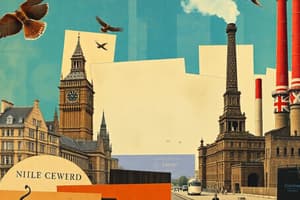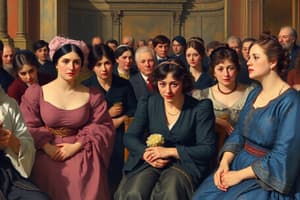Podcast
Questions and Answers
The post-war British society was undeniably different from the society that had entered the First World War. Under-represented groups such as women and, in particular, the working class became ______ organised and more powerful during the war.
The post-war British society was undeniably different from the society that had entered the First World War. Under-represented groups such as women and, in particular, the working class became ______ organised and more powerful during the war.
better
Trade unions grew in ______ and the growing Labour party represented the interests of the less privileged in the Parliament.
Trade unions grew in ______ and the growing Labour party represented the interests of the less privileged in the Parliament.
membership
During the war, many women had been employed in the factories, giving them a wage and therefore a certain degree of ______.
During the war, many women had been employed in the factories, giving them a wage and therefore a certain degree of ______.
independence
Women over 30 had been given the vote in 1918, and by 1928 this had been extended to all women over the age of ______.
Women over 30 had been given the vote in 1918, and by 1928 this had been extended to all women over the age of ______.
The Housing Act required local councils to survey their housing needs, and start building houses to replace ______.
The Housing Act required local councils to survey their housing needs, and start building houses to replace ______.
The Unemployment Insurance Act set up the ______ system that provided 39 weeks of unemployment benefits.
The Unemployment Insurance Act set up the ______ system that provided 39 weeks of unemployment benefits.
The Education Act raised the school leaving age to ______.
The Education Act raised the school leaving age to ______.
The social reforms laid the foundations of what would become known as the ______ state.
The social reforms laid the foundations of what would become known as the ______ state.
Poverty amongst the unemployed contrasted strikingly with the ______ of the middle and upper classes.
Poverty amongst the unemployed contrasted strikingly with the ______ of the middle and upper classes.
Consumerism was on the ______, car ownership became more common and it was also a time of massive, mostly suburban and privately financed, house building.
Consumerism was on the ______, car ownership became more common and it was also a time of massive, mostly suburban and privately financed, house building.
‘Roaring Twenties’ was a decade of ______.
‘Roaring Twenties’ was a decade of ______.
The process of massive, mostly suburban and privately financed, house building was interrupted by the Second World War and consequent ______ but it soon reasserted itself.
The process of massive, mostly suburban and privately financed, house building was interrupted by the Second World War and consequent ______ but it soon reasserted itself.
The Housing Act required local councils to survey their housing needs, and start building houses to replace ______
The Housing Act required local councils to survey their housing needs, and start building houses to replace ______
The Unemployment Insurance Act set up the ______ system that provided 39 weeks of unemployment benefits
The Unemployment Insurance Act set up the ______ system that provided 39 weeks of unemployment benefits
The Education Act raised the school leaving age to ______
The Education Act raised the school leaving age to ______
The post-war British society was undeniably different from the society that had entered the First World War. Under-represented groups such as ______ became better organised and more powerful during the war
The post-war British society was undeniably different from the society that had entered the First World War. Under-represented groups such as ______ became better organised and more powerful during the war
During the war, many women had been employed in the factories, giving them a wage and therefore a certain degree of ______
During the war, many women had been employed in the factories, giving them a wage and therefore a certain degree of ______
Women over 30 had been given the ______ in 1918, and by 1928 this had been extended to all women over the age of 21
Women over 30 had been given the ______ in 1918, and by 1928 this had been extended to all women over the age of 21
Trade unions grew in ______ and the growing Labour party represented the interests of the less privileged in the Parliament
Trade unions grew in ______ and the growing Labour party represented the interests of the less privileged in the Parliament
The social reforms laid the foundations of what would become known as the ______
The social reforms laid the foundations of what would become known as the ______
Poverty amongst the unemployed contrasted strikingly with the affluence of the middle and upper classes which enjoyed the invention of new ______, such as radio, or the “wireless”, or the fledgling pre-war cinema
Poverty amongst the unemployed contrasted strikingly with the affluence of the middle and upper classes which enjoyed the invention of new ______, such as radio, or the “wireless”, or the fledgling pre-war cinema
Consumerism was on the increase, ______ ownership became more common and it was also a time of massive, mostly suburban and privately financed, house building
Consumerism was on the increase, ______ ownership became more common and it was also a time of massive, mostly suburban and privately financed, house building
The 'Roaring Twenties' was a decade of ______
The 'Roaring Twenties' was a decade of ______
The government passed several major laws which were to have a great impact on people lives in the 1920s and over the next few ______
The government passed several major laws which were to have a great impact on people lives in the 1920s and over the next few ______
What was the impact of World War I on under-represented groups such as women and the working class in British society?
What was the impact of World War I on under-represented groups such as women and the working class in British society?
What was the role of trade unions during and after World War I in British society?
What was the role of trade unions during and after World War I in British society?
What was the significance of the passing of the Housing Act in British society?
What was the significance of the passing of the Housing Act in British society?
What was the purpose of the Unemployment Insurance Act in British society?
What was the purpose of the Unemployment Insurance Act in British society?
What was the impact of the Education Act on British society?
What was the impact of the Education Act on British society?
What was the main goal of the social reforms in British society during the 1920s?
What was the main goal of the social reforms in British society during the 1920s?
What was the impact of the post-war technological advancements on British society?
What was the impact of the post-war technological advancements on British society?
What was the nickname given to the 1920s in British society?
What was the nickname given to the 1920s in British society?
What was the impact of the Second World War on the process of suburban house building in British society?
What was the impact of the Second World War on the process of suburban house building in British society?
What was the impact of the passing of the Women's Suffrage Act in 1918 on British society?
What was the impact of the passing of the Women's Suffrage Act in 1918 on British society?
What was the impact of the growing Labour party on British society during and after World War I?
What was the impact of the growing Labour party on British society during and after World War I?
What was the impact of the employment of women in factories during World War I on British society?
What was the impact of the employment of women in factories during World War I on British society?
Flashcards are hidden until you start studying




